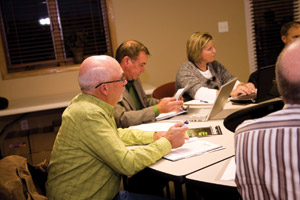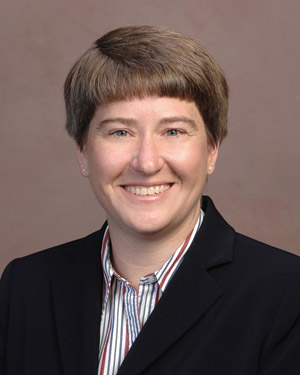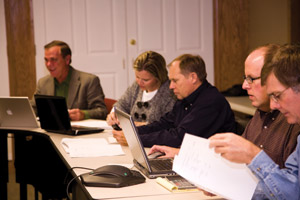Always Above Board





December 27, 2010
BY Holly Jessen
Fiduciary duties. Due diligence. Risk management. Strategic planning. Ethanol plant board members have a list of weighty duties to navigate.
Jill Zimmerman keeps the shareholders in mind at all times as she participates in the regular board meetings of East Kansas Agri-Energy LLC. The duty of a board member is to represent shareholders, she says, and everything the board does should be examined through that lens. Does it increase shareholder value? Is it good for the company? Does it fit with the goals for the future? This can be a heavy responsibility, especially because many times shareholders are family, friends and neighbors. "You sat on the front porch and you sold it to your brother, so if it doesn't do good, you are in trouble," she tells EPM.
Learning Curve
In his time working with ethanol plant board members, Scott McDermott, a partner in accounting firm Ascendant Partners Inc., has noticed there are many inexperienced board members. Compared to the agriculture and food industries, which the company also works with, the ethanol industry is still a relatively young industry. "A lot of them have very smart board members, but there is not a ton of board experience," he says.
An inexperienced board member will need time to understand such basic things as how to conduct a board meeting, set up and work on committees and prioritize important decisions. There's two ways to learn those things, No. 1, from other board members with more experience or, No. 2, through the "school of hard knocks," he says.
Beyond that, board members need to know their way around commodity markets and understand commodity volatility. In some cases, an ethanol plant board member may be a newcomer to the industry. "There's a pretty tough learning curve in an industry that is as volatile as it gets, from a margin business volatility standpoint," McDermott tells EPM.
Another issue is that different people got into the business for different reasons. Some are long term players in the ethanol business. They are patient and willing to wait to get cash out the business. Others got involved during the boom and thought that would last forever, he says. They thought ethanol was going to be a money printing press without risk. "Frankly there is some sticker shock," he says. "When you make good money, you make good money, but it also comes with some losses."
Board members with different priorities can cause divisions because there isn't a single philosophy for long term capital planning. It disrupts the company's ability to set or pursue a strategic vision. "That division keeps them from being effective and having the focused future that they planned for," he says. "Even when you plan, it sometimes doesn't work, but some of these [boards] seem not to have a plan because of the divisions in their boards and management. Fully Engaged Board members have very important fiduciary duties. If they don't properly carry out these duties, they could be legally liable-as a board or even as an individual.
"Sometimes I don't think board members fully understand what fiduciary duties and liability exposure they really have by being on a board," says Donna Funk, a member of Kansas-based accounting and consulting firm, Kennedy and Coe. Funk has seen cases of board members not being fully engaged at the board level. Some vote on things they don't understand and without doing their due diligence, she says.
Another thing board members should keep in mind is that if information is shared with shareholders or the community, it should be shared with everyone, not just a few. "Sometimes it takes a while for them to understand what gets discussed in the board room needs to stay in the board room and not get talked about at the coffee shop the next day," Funk says.
If a lawsuit is filed it doesn't mean anybody did anything wrong or that the lawsuit will be successful, but it is something to be cautious about. "You've got to be careful in how you're presenting yourself and what information you are sharing so that you don't help create that false perception," Funk says. McDermott agrees that board members need a better understanding of their legal obligations. Some simply don't know what they are, while others need to be reminded, something he believes the legal counsel to the board should do periodically. "To be honest with you, I've been very surprised that there hasn't been more litigation during this tough time," he says.
Advertisement
Advertisement
The thing to remember is that these regulations and rules are put in place for a reason. "We don't like them," he adds, "but we hate to admit that they probably make for a better company."
Brad Rayl, who serves as a board member for Kansas Ethanol LLC, in Lyons, Kan., confirms that fiduciary duties can be a tricky thing. Still, the board he serves on is made up of people with extensive experience on other boards so they have a good understanding of what it means. Care needs to be taken when board members do business with the ethanol plant-a highly likely scenario in rural America. As long as everything is above board, and everyone knows what's happening, there's nothing wrong with that, Rayl says.
At Kansas Ethanol some board members are farmers and sell grain to the plant, but they don't get special treatment. Another director owns a feedlot and buys distillers grains from the plant, and is treated like any other customer. Rayl is part owner in an insurance broker agency which provides insurance to the plant, but his company isn't the only one that board members consider when it's time to renew policies, he says.
Zimmerman sees due diligence as the most critical task a board member can do. It's vital, she says, to be very thorough and never underestimate the amount of homework you need to do to understand all facets of the business and company. This is necessary to help make good decisions and speak intelligently at board meetings. "It's your responsibility to bring yourself up to speed," she says.
Top Level Focus
Funk says boards often struggle with finding the right balance between what the board is responsible for and what it should let management do. Although how that separation is set up varies, the board should not cross the line into what it is paying management to do. "The board is the top level, overarching level of governance," she says. "The board's focus should be more on the corporate strategy, goal setting-the vision piece."
Management, on the other hand, is in charge of the day-to-day operations. For example, the board hires the top level management and the management hires the employees below them. The board should restrict its involvement in employee issues to the top level only, leaving management to deal with other employees. "If an employee would come to me with a problem, I am the wrong guy to talk to," Rayl says.
In some cases the board members are people who have been involved with the project from day one, Funk says, starting with fundraising all the way to plant construction and start up. They may not realize what they are doing, but they sometimes attempt to micromanage every decision simply because they are so used to being heavily involved. Once the board has hired a management team, however, it's time to step back and let them do their jobs. "There very often is a struggle in that transition," she says.
While a board may feel like it is directing a small company, it's best not to think that way, Funk tells board members. She advises them to think of themselves as a company with a larger corporate structure, such as IBM Corp.-a board that meets regularly, not to make the day-to-day decisions of the company, but to set higher level corporate strategy.
McDermott agrees that having clear roles and responsibilities is key. "If everybody is a manager, nobody is a manager," McDermott says. "You've got to have clear leadership-clear management of the company, clear board leadership."
The structure can vary, however. On a co-op board-a background many ethanol plant board members come from-the management sets the vision and the board reinforces it. Some ethanol plants combine elements of a co-op board and a public corporation. "It depends on the types of board members and types of shareholders where in the continuum you find the model," he says, adding that every board needs to find a clear separation between the duties of the board and management, and do it in a way that works for it.
Dick Sterrett serves on three ethanol plant boards: Kansas Ethanol, Western Plains Energy LLC and Sterling Ethanol LLC, which also includes Yuma Ethanol LLC and Bridgeport Ethanol LLC. He says it this way. "Don't rock the boat that's sailing fine."
Advertisement
Advertisement
Building Expertise
With all the potential pitfalls facing ethanol plant boards, how can boards educate themselves? Funk suggests reading books on leadership and boardsmanship along with attending board training sessions. Another way to gain insight is by talking to seasoned board members and the board attorney.
Generalized board leadership programs are helpful, McDermott agrees. But training that's specific to ethanol plant boards is hard to find. "In this space, there's nothing specialized," he says.
One thing boards can do is hire consulting companies to assist. Kennedy and Coe works with boards during strategic planning sessions to help them understand roles and responsibilities, how to have effective planning sessions and set goals and action items, Funk says. Ascendant Partners offers help with strategic planning too, plus works with plants on operational benchmarking and performance improvement initiatives, McDermott adds.
East Kansas Agri-Energy works with Kennedy and Coe at yearly strategic planning sessions for the board and upper level management. It's a very valuable exercise that Zimmerman recommends other boards take part in. They use the SWOT Analysis tool, which evaluates strengths, weaknesses, opportunities and threats, to determine if last year's goals were achieved and whether anything has changed. The board then reviews it quarterly, she says. The difficulty is that some board members don't realize there's a problem until faced with an issue. Often the attitude is that other boards may need help but their board is just fine. "They don't realize how disconnected they are," McDermott says.
But in times like these, boards can't afford to neglect a strong strategic focus. Without it, plants are put into the position of getting handed a future that simply happens, versus a future that's wanted. "Not having a plan for where you want to be is a recipe for getting an outcome you don't like," he says.
Step up and Serve
Despite the difficulty and potential liabilities facing board members, Zimmerman, Sterrett and Rayl say it is a rewarding experience. Zimmerman remembers the early days when the board wasn't sure where the next dollar was going to come from. Today, she says with satisfaction, the plant has very little debt and investors have all their money back plus more. Before Sterrett started as a board member he didn't realize how long it would take a diversified group of people to make good decisions, he says. In addition, it can be difficult to find dedicated people willing to serve-much like in politics. Still, he encourages people to open their eyes and jump in. "Columbus took a chance," he says. "Why not you?"
Rayl has fun doing what he does. "If you don't look forward to doing something, why subject yourself to it?" he asks. "Life is too short I think."
Author: Holly Jessen Associate Editor,
Ethanol Producer Magazine
(701) 738-4946 hjessen@bbiinternational.com
Upcoming Events





